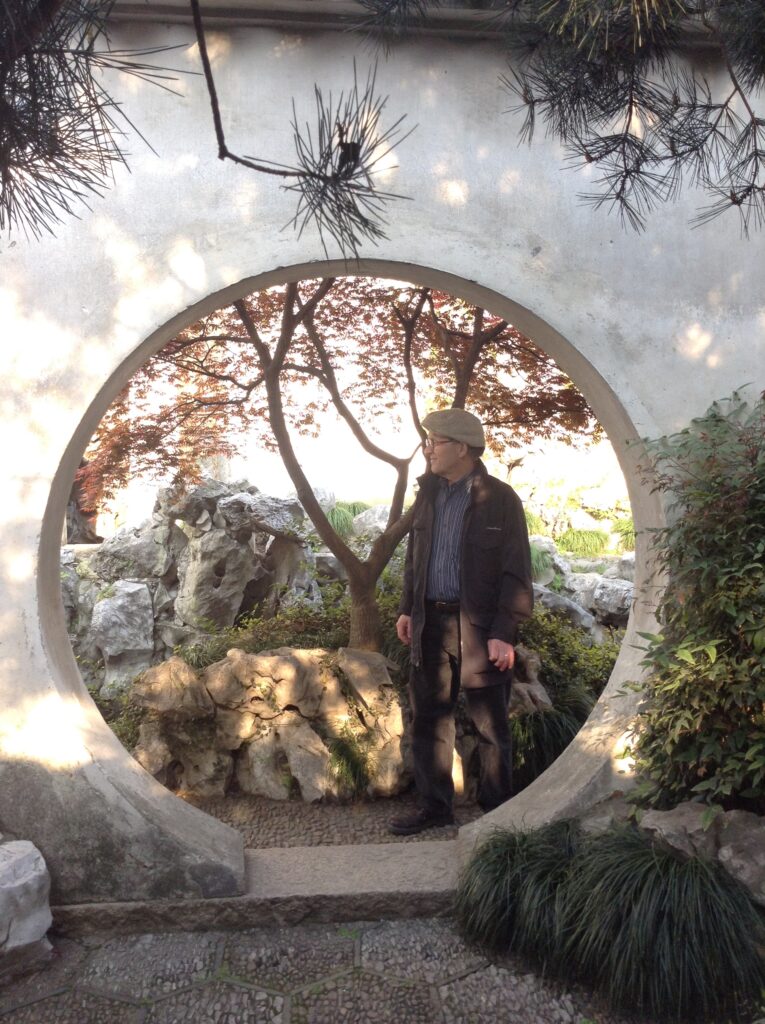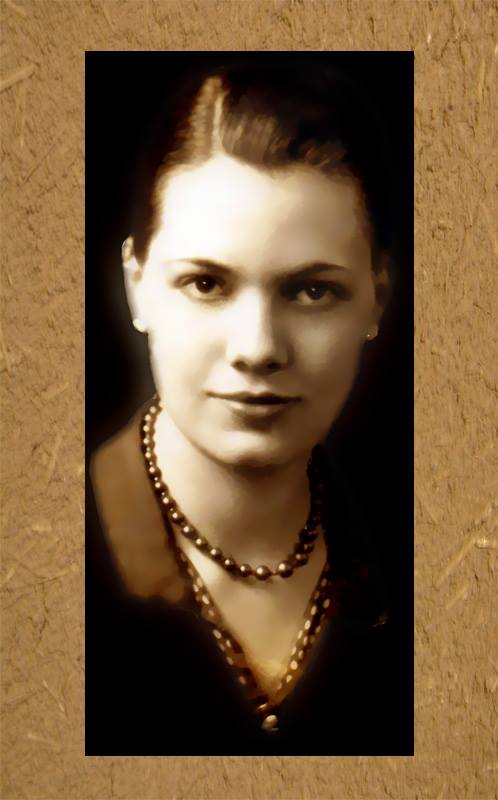Version 1:
This farmer had only one horse, and one day the horse ran away. The neighbors came to condole over his terrible loss. The farmer said, “What makes you think it is so terrible?”
A month later, the horse came home–this time bringing with her two beautiful wild horses. The neighbors became excited at the farmer’s good fortune. Such lovely strong horses! The farmer said, “What makes you think this is good fortune?”
The farmer’s son was thrown from one of the wild horses and broke his leg. All the neighbors were very distressed. Such bad luck! The farmer said, “What makes you think it is bad?”
A war came, and every able-bodied man was conscripted and sent into battle. Only the farmer’s son, because he had a broken leg, remained. The neighbors congratulated the farmer. “What makes you think this is good?” said the farmer.
As told by Executive editor, Elise Hancock, in the Johns Hopkins Magazine, November 1993, page 2, in section entitled Editor’s Note.
Version 2:
A man named Sei Weng owned a beautiful mare which was praised far and wide. One day this beautiful horse disappeared. The people of his village offered sympathy to Sei Weng for his great misfortune. Sei Weng said simply, “That’s the way it is.”
A few days later the lost mare returned, followed by a beautiful wild stallion. The village congratulated Sei Weng for his good fortune. He said, “That’s the way it is.”
Some time later, Sei Weng’s only son, while riding the stallion, fell off and broke his leg. The village people once again expressed their sympathy at Sei Weng’s misfortune. Sei Weng again said, “That’s the way it is.”
Soon thereafter, war broke out and all the young men of the village except Sei Weng’s lame son were drafted and were killed in battle. The village people were amazed as Sei Weng’s good luck. His son was the only young man left alive in the village. But Sei Weng kept his same attitude: despite all the turmoil, gains and losses, he gave the same reply, “That’s the way it is.”
As told by Chin-Ning Chu, in “The Asian Mind Game: unlocking the hidden agenda of the Asian business culture — a westerner’s survival manual,” New York:Macmillan Publishing Company, page 182. (1991)
Version 3:
A man who lived on the northern frontier of China was skilled in interpreting events. One day, for no reason, his horse ran away to the nomads across the border. Everyone tried to console him, but his father said, “What makes you so sure this isn’t a blessing?” Some months later his horse returned, bringing a splendid nomad stallion. Everyone congratulated him, but his father said, “What makes you so sure this isn’t a disaster?” Their household was richer by a fine horse, which his son loved to ride. One day he fell and broke his hip. Everyone tried to console him, but his father said, “What makes you so sure this isn’t a blessing?”
A year later the nomads came in force across the border, and every able-bodied man took his bow and went into battle. The Chinese frontiersmen lost nine of every ten men. Only because the son was lame did the father and son survive to take care of each other. Truly, blessing turns to disaster, and disaster to blessing: the changes have no end, nor can the mystery be fathomed.
The Lost Horse, a Chinese Folktale.
As told by Ellen J. Langer, in” The Power of Mindful Learning,” Reading, Mass: Addison-Wesley, page 99-100. (1997).
Version 4:
近塞上之人有善術者,馬無故亡而入胡,人皆弔之。其父曰:「此何遽不為福乎!」居數月,其馬將胡駿馬而歸,人皆賀之。其父曰:「此何遽不能為禍乎!」家富良馬,其子好騎,墮而折其髀,人皆弔之。其父曰:「此何遽不為福乎!」居一年,胡人大入塞,丁壯者引弦而戰,近塞之人,死者十九,此獨以跛之故,父子相保。故福之為禍,禍之為福,化不可極,深不可測也。
Translation (see above link for annotations and comment):
Among the people who lived close to the border, there was a man who led a righteous life. Without reason, his horse escaped, and fled into barbarian territory. Everyone pitied him, but the old man said : “what makes you think this is not a good thing?”
Several months later, his horse returned, accompanied by a superb barbarian stallion. Everyone congratulated him. But the old man said: “what makes you think this is cannot be a bad thing?”
The family was richer from a good horse, his son enjoyed riding it. He fell and broke his hip. Everyone pitied him, but the old man said: “what makes you think this is not a good thing!”
One year later, a large party of barbarians entered the border. All the valid men drew their bows and went to battle. From the people living around the border, nine out of ten died. But just because he was lame, the old man and his son were both spared.
Version 5 (under construction)
Version 6:
THE KING AND HIS FRIEND
An African king had a close friend who had the habit of remarking “this
is good” about every occurrence in life no matter what it was. One day
the king and his friend were out hunting. The king’s friend loaded a
gun and handed it to the king, but alas he loaded it wrong and when the
king fired it, his thumb was blown off.
“This is good!” exclaimed his friend.
The horrified and bleeding king was furious. “How can you say this is
good? This is obviously horrible!” he shouted. The king put his friend in jail.
About a year later the king went hunting by himself. Cannibals captured
him and took him to their village. They tied his hands, stacked some
wood, set up a stake and bound him to it. As they came near to set fire
to the wood, they noticed that the king was missing a thumb. Being
superstitious, they never ate anyone who was less than whole. They
untied the king and sent him on his way.
Full of remorse the king rushed to the prison to release his friend.
“You were right, it WAS good” the king said.
The king told his friend how the missing thumb saved his life and
added, “I feel so sad that I locked you in jail.That was such a bad
thing to do”
“NO! this is good!” responded his delighted friend.
“Oh, how could that be good my friend, I did a terrible thing to you while I
owe you my life”.
“It is good” said his friend, “because if I wasn’t in jail I would have been
hunting with you and they would have killed ME.”
Source unknown
Version 7:
Taoist Farmer stories are based on the Chinese belief that life has its ups and downs, and does not always go up. Click on the following link to read a story I wrote about the ups and downs in the lives of some chickens, and one eccentric chicken’s interpretation of whether the farmer that feeds them is good or bad.
The Benevolent Farmer? [dead link]
Here is another related tidbit: When Communist era Premier Chou En-Lai was asked whether or not the French revolution was good or bad, his response was “It’s too early to tell.” (From “The Geography of Thought, How Asians and Westerners Think Differently…and Why,” by
Richard E. Nisbett, NY:Simon and Schuster, 2003, page 13). When I first read this, I couldn’t stop laughing!
Version 8:
Three Questions, a short story by Leo Tolstoy, has a similar flavor. (From “Twenty-three Tales “published around 1872. This version, translated by L. and A. Maude and published by Funk & Wagnalls Company, New York, 1907. Other adaptations: 1, 2, 3
IT once occurred to a certain king, that if he always knew the right time to begin everything; if he knew who were the right people to listen to, and whom to avoid, and, above all, if he always knew what was the most important thing to do, he would never fail in anything he might undertake.
And this thought having occurred to him, he had it proclaimed throughout his kingdom that he would give a great reward to any one who would teach him what was the right time for every action, and who were the most necessary people, and how he might know what was the most important thing to do. And learned men came to the King, but they all answered his questions differently.
In reply to the first question, some said that to know the right time for every action, one must draw up in advance, a table of days, months and years, and must live strictly according to it. Only thus, said they, could everything be done at its proper time. Others declared that it was impossible to decide beforehand the right time for every action; but that, not letting oneself be absorbed in idle pastimes, one should always attend to all that was going on, and then do what was most needful. Others, again, said that however attentive the King might be to what was going on, it was impossible for one man to decide correctly the right time for every action, but that he should have a Council of wise men, who would help him to fix the proper time for everything.
But then again others said there were some things which could not wait to be laid before a Council, but about which one had at once to decide whether to undertake them or not. But in order to decide that one must know beforehand what was going to happen. It is only magicians who know that; and, therefore in order to know the right time for every action, one must consult magicians.
Equally various were the answers to the second question. Some said, the people the King most needed were his councillors; others, the priests; others, the doctors; while some said the warriors were the most necessary.
To the third question, as to what was the most important occupation: some replied that the most important thing in the world was science. Others said it was skill in warfare; and others, again, that it was religious worship.
All the answers being different, the King agreed with none of them, and gave the reward to none. But still wishing to find the right answers to his questions, he decided to consult a hermit, widely renowned for his wisdom.
The hermit lived in a wood which he never quitted and he received none but common folk. So the King put on simple clothes, and before reaching the hermit’s cell dismounted from his horse, and, leaving his bodyguard behind, went on alone.
When the King approached, the hermit was digging the ground in front of his hut. Seeing the King, he greeted him and went on digging. The hermit was frail and weak, and each time he stuck his spade into the ground and turned a little earth, he breathed heavily.
The King went up to him and said: ‘I have come to you, wise hermit, to ask you to answer three questions: How can I learn to do the right thing at the right time? Who are the people I most need, and to whom should I, therefore, pay more attention than to the rest? And, what affairs are the most important and need my first attention?’ The hermit listened to the King, but answered nothing. He just spat on his hand and recommenced digging.
‘You are tired,’ said the King, ‘let me take the spade and work awhile for you.’
‘Thanks!’ said the hermit, and, giving the spade to the King, he sat down on the ground.
When he had dug two beds, the King stopped and repeated his questions. The hermit again gave no answer, but rose, stretched out his hand for the spade, and said:
‘Now rest awhile — and let me work a bit.’
But the King did not give him the spade, and continued to dig. One hour passed, and another. The sun began to sink behind the trees, and the King at last stuck the spade into the ground, and said:
‘I came to you, wise man, for an answer to my questions. If you can give me none, tell me so, and I will return home.’
‘Here comes some one running,’ said the hermit, ‘let us see who it is.’
The King turned round, and saw a bearded man come running out of the wood. The man held his hands pressed against his stomach, and blood was flowing from under them. When he reached the King, he fell fainting on the ground moaning feebly. The King and the hermit unfastened the man’s clothing. There was a large wound in his stomach. The King washed it as best he could, and bandaged it with his handkerchief and with a towel the hermit had. But the blood would not stop flowing, and the King again and again removed the bandage soaked with warm blood, and washed and rebandaged the wound. When at last the blood ceased flowing, the man revived and asked for something to drink. The King brought fresh water and gave it to him. Meanwhile the sun had set, and it had become cool. So the King, with the hermit’s help, carried the wounded man into the hut and laid him on the bed. Lying on the bed the man closed his eyes and was quiet; but the King was so tired with his walk and with the work he had done, that he crouched down on the threshold, and also fell asleep — so soundly that he slept all through the short summer night. When he awoke in the morning, it was long before he could remember where he was, or who was the strange bearded man lying on the bed and gazing intently at him with shining eyes.
‘Forgive me!’ said the bearded man in a weak voice, when he saw that the King was awake and was looking at him.
‘I do not know you, and have nothing to forgive you for,’ said the King.
‘You do not know me, but I know you. I am that enemy of yours who swore to revenge himself on you, because you executed his brother and seized his property. I knew you had gone alone to see the hermit, and I resolved to kill you on your way back. But the day passed and you did not return. So I came out from my ambush to find you, and I came upon your bodyguard, and they recognized me, and wounded me. I escaped from them, but should have bled to death had you not dressed my wound. I wished to kill you, and you have saved my life. Now, if I live, and if you wish it, I will serve you as your most faithful slave, and will bid my sons do the same. Forgive me!’
The King was very glad to have made peace with his enemy so easily, and to have gained him for a friend, and he not only forgave him, but said he would send his servants and his own physician to attend him, and promised to restore his property.
Having taken leave of the wounded man, the King went out into the porch and looked around for the hermit. Before going away he wished once more to beg an answer to the questions he had put. The hermit was outside, on his knees, sowing seeds in the beds that had been dug the day before.
The King approached him, and said:
‘For the last time, I pray you to answer my questions, wise man.’
‘You have already been answered!’ said the hermit still crouching on his thin legs, and looking up at the King, who stood before him.
‘How answered? What do you mean?’ asked the King.
‘Do you not see,’ replied the hermit. ‘If you had not pitied my weakness yesterday, and had not dug these beds for me, but had gone your way, that man would have attacked you, and you would have repented of not having stayed with me. So the most important time was when you were digging the beds; and I was the most important man; and to do me good was your most important business. Afterwards, when that man ran to us, the most important time was when you were attending to him, for if you had not bound up his wounds he would have died without having made peace with you. So he was the most important man, and what you did for him was your most important business. Remember then: there is only one time that is important — Now! It is the most important time because it is the only time when we have any power. The most necessary man is he with whom you are, for no man knows whether he will ever have dealings with any one else: and the most important affair is, to do him good, because for that purpose alone was man sent into this life!’
1903.
Last updated 18 November 2006






